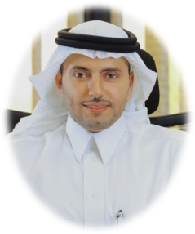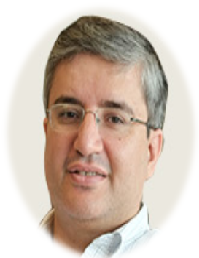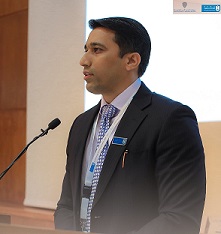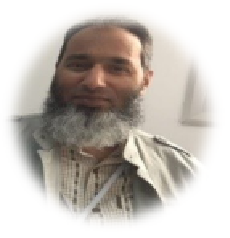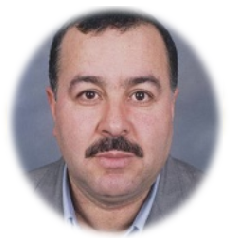 | |
Prof. Ahmed Bouridane | |
Professor of Computer Science, School of Computer and Information Sciences, Northumbria University at Newcastle, UK |
Short Biography:
Prof. Ahmed Bouridane received the "Ingenieur d'Etat" degree in electronics from "Ecole Nationale Polytechnique" of Algiers (ENPA), Algeria, in 1982, the M.Phil. degree in electrical engineering (VLSI design for signal processing) from the University of Newcastle-Upon-Tyne, U.K., in 1988, and the PhD degree in electrical engineering (computer vision) from the University of Nottingham, U.K., in 1992. He worked as a Research Developer in remote monitoring and access control applications from 1992 to 1994. He joined Queen's University Belfast, Belfast, U.K. in 1994 as a lecturer in computer architecture and image processing and then was promoted to reader in Computer Science. Currently, he is a full Professor in Image Engineering and Security at Northumbria University at Newcastle (UK). His research interests include Imaging for Forensics and Security, Biometrics, Homeland Security, Image/Video Watermarking and Cryptography. He has authored and co-authored more than 350 publications and two research books. Prof. Bouridane is a Senior Member of IEEE.
Brief Introduction on the Keynote Speech:
Title: Detection of hidden communications in unsecure environments
Criminals and hackers have used steganography to hide their communications and the concern in law enforcement is that it is being used to "protect" communication amongst members of a criminal conspiracy [26-29]. Unlike cryptography, which merely obscures the communication between two parties when observed by a third party, steganography hides the very existence of hidden messages or covert communications channel. Today criminal groups are on the cutting edge of technology and use computers, the Internet, and steganography to conduct business and can make their transmission of messages go completely undetected. This seminar will describe video steganography technology in the compressed domain and how it can be used to hide messages and communications in an undetectable manner. The presentation will also discuss the concept of video steganalysis endowed with the capability to detect hidden messages and communications from videos exchanged/shared (in a compressed domain) in untrusted channels such as Internet and social media websites. The detection, location and extraction of hidden messages and communications is an important capability of the system and will be used for further extracting the hidden messages.
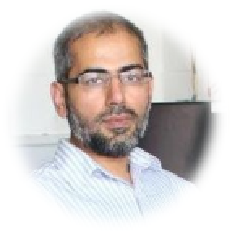 | |
Prof. Amir Hussain | |
Professor of Computing Science, Edinburgh Napier University, Scotland, UK |
Short Biography:
Amir Hussain obtained his BEng (with the highest 1st Class Honours, with distinction) and PhD (in novel neural network architectures and algorithms for real-world applications), both from the University of Strathclyde in Glasgow, UK, in 1992 and 1997 respectively. Following postdoctoral and senior academic positions held at the Universities of West of Scotland (1996-98), Dundee (1998-2000) and Stirling (2000-18) respectively, he joined Edinburgh Napier University (UK) in 2018, as founding Director of the Cognitive Big Data and Cybersecurity (CogBiD) Research Lab, managing over 25 academic and research staff. He is invited Visiting Professor at leading Universities and Research and Innovation Centres world-wide, including Taibah Valley at Taibah University (Madina, Saudi Arabia), Oxford University (UK), Shanghai and Xi'an Jiaotong-Liverpool Universities (China).
Professor Hussain’s research interests are cross-disciplinary and industry focused, aimed at pioneering brain-inspired, cognitive Big Data technology for solving complex real-world problems. In 2017, he was ranked, in an independent survey (published in Elsevier’s Information Processing and Management Journal), as one of world’s top two most productive, highly-cited researchers in (Big Data) sentiment analytics (since 2000). He has (co)authored three international patents, around 400 publications, with nearly 150 journal papers, and over a dozen Books, including the world’s first research monographs in multi-disciplinary areas of: sentic computing-based sentiment analysis, cognitive agent-based computing, and cognitively-inspired audio-visual speech processing. He has led major multi-disciplinary research projects, as Principal Investigator, funded by national and European research councils, local and international charities and industry, and has supervised more than 30 PhDs to-date.
He is founding Editor-in-Chief of (Springer Nature’s) Cognitive Computation journal (SCI Impact Factor (IF): 3.48) and BMC Big Data Analytics journal (published by BioMed Central (BMC) – part of Springer Nature). He has been appointed Associate Editor of several other world-leading journals including, IEEE Transactions on Neural Networks and Learning Systems (SCI IF 6.1), Elsevier’s Information Fusion journal (SCI IF: 5.9), the IEEE Transactions on Emerging Topics in Computational Intelligence, and the IEEE Computational Intelligence Magazine (SCI IF: 6.34). Amongst other distinguished roles, he is General Chair for IEEE WCCI 2020 (the world's largest and top IEEE technical event in Computational Intelligence, comprising IJCNN, FUZZ-IEEE and IEEE CEC, attended by ~2,000 delegates), and Vice-Chair of Emergent Technologies Technical Committee of the IEEE Computational Intelligence Society. He is Chapter Chair of the IEEE UK & RI Industry Applications Society Chapter and Senior Fellow of the Brain Sciences Foundation (USA).
Brief Introduction on the Keynote Speech:
Title: Towards Cognitive Big Data Sentiment Analytics: Real-world case studies and emerging research challenges
Cognitive Big Data Sentiment Analytics is a rapidly developing discipline, bringing together neurobiology, cognitive psychology, Big Data, AI and Natural Language Processing. Ongoing pioneering work at Edinburgh Napier University is exploring development of cognitively-inspired Big Data Sentiment Analytics for engineering the secure and intelligent systems of tomorrow. Selected case studies are presented in this talk exploring future open-domain sentiment analysis of natural language text, using sentic computing: a novel multi-disciplinary paradigm, exploiting the semantic, latent and implicit meaning of natural language concepts. Ongoing extensions of this work include a cognitively-inspired emotion recognition system based on contextual multimodal input, including text, audio and facial information, leading to more natural human computer interaction, and future secure and smart e-applications. We present a brief summary of these exciting multi-disciplinary research areas, and outline some future research directions and challenges.
| |
Prof.David Keyes | |
Professor of Applied Mathematics and Computational Science and Director of Extreme Computing Research Center, King Abdullah University of Science and Technology (KAUST), Kingdom of Saudi Arabia |
Short Biography:
David Keyes directs the Extreme Computing Research Center at the King Abdullah University of Science and Technology (KAUST). He works at the interface between parallel computing and the numerical analysis of PDEs, with a focus on scalable implicit solvers. Newton-Krylov-Schwarz (NKS) and Additive Schwarz Preconditioned Inexact Newton (ASPIN) are methods he helped name and is helping to popularize. Before joining KAUST as a founding dean in 2009, he led multi-institutional scalable solver software projects in the SciDAC and ASCI programs of the US DOE, ran university collaboration programs at LLNL’s ISCR and NASA’s ICASE, and taught at Columbia, Old Dominion, and Yale Universities. He is a Fellow of SIAM, AMS, and AAAS, and has been awarded the ACM Gordon Bell Prize, the IEEE Sidney Fernbach Award, and the SIAM Prize for Distinguished Service to the Profession. He earned a BSE in Aerospace and Mechanical Sciences from Princeton in 1978 and a PhD in Applied Mathematics from Harvard in 1984.
Brief Introduction on the Keynote Speech:
Title: The Convergence of Big Data and Large-scale Simulation
Motivations abound for the convergence of large-scale simulation and big data: (1) scientific and engineering advances, (2) computational and data storage efficiency, (3) economy of data center operations, and (4) the development of a competitive workforce.
To take advantage of advances in analytics and learning, large-scale simulations should incorporate these technologies in-situ, rather than as forms of post-processing. This potentially reduces IO, may obviate significant computation in unfruitful regions of physical parameter space, offers smart data compression, and potentially improves the results of the simulation, itself, since many simulations incorporate empirical relationships currently tuned by human experts.
Flipping the perspective, simulation potentially provides significant benefits to analytics and learning workflows. Theory-guided data science is an emerging paradigm that aims to improve the effectiveness of data science models, as a form of regularization, wherein non-unique candidates are penalized by physical constraint. Simulation can also provide training data for machine learning.
Finally, much software has been developed for large-scale simulation, particularly in data-sparse linear algebra and second-order optimization, that promises to expand the practical reach of analytics; while the complex parameterized codes of large-scale simulation may in turn be tuned for computational performance by machine learning – applying machine learning to the machine.
| |
Dr.Esam Abdullah Alwagait | |
Associate Professor at College of Computer and Information Sciences in King Saud University. Currently, he is CEO of National Digital Transformation Unit |
Short Biography:
Brief Introduction on the Keynote Speech:
Title:
coming soon ...
 | |
Prof. Jamil Ahmad | |
Vice Chancellor, Kohat University of Science and Technology, Pakistan |
Short Biography:
Prof. Jamil Ahmad obtained his PhD from Department of Electrical and Electronics Engineering, Kings’ College London, UK, MSc in Information Technology from University of Warwick, UK, and MSc in Computer Science from University of Peshawar. He has over 22 years of post PhD experience of Administration, Research, Teaching, and project management at various international academic institutions. Professor Ahmad published over 110 papers/book chapters in the areas of Science, Engineering and Technology in international journals and refereed conferences. Obtained grants for research and academic projects from various organizations including National Information and Communication Technology (ICT) R&D Fund Pakistan, HEC-British Council linkage program, and the UK Government under PMI 2 program. Professor Ahmad was also honored with the award of Charles Wallace Pakistan Trust Visiting fellowship, UK (2012-13) and International Visiting Leadership Program (IVLP) fellowship (August – September 2007), USA. He is a Fellow of the British Computer Society, Senior Member of IEEE, CEng, Member IET and Member ACM.
Currently, he is holding the position of Vice Chancellor Kohat University of Science and Technology (KUST) Kohat, Khyber Pakhtunkhwa (KPK). Pakistan.
Brief Introduction on the Keynote Speech:
Title: Artificial Neural Network: A Case study on
Smart Intelligence - An OCR Engine for Android & iPhone Smart Phone
Mobile Computing is considered to be one of the fascinating area of research of the computing discipline these days. Availability of platforms like smart phones, various mobile devices, and computing technology are going to play a vital role to this end. Even in the time of economic crunch in 2008-2009 smart phones market has been seeing continuous improvement and big players like Google, RIM and PALM have made heavy investments in this market in one form or the other. Some of the companies have focused on the hardware while some of the companies have realized that availability of killer applications on the smart phones can enhance their revenue many times. Mobile environment, though constrained, provides some interesting features and facilities not directly available on the desktop computers. One such feature is the availability of integrated cameras on most of the smart phones. This feature can be used to provide many interesting applications related to Character Recognition but before that some API / framework or engine should be there that can provide the basic building blocks for the development of applications related to Character Recognition. In this talk I will present details about one of our R&D funded projects completed by our group. In this project we develop a state of the art OCR Engine which can be used by the developers to develop their own applications. Artificial Intelligence models were used to implement character recognition so a smart system can be developed for OCR engine. The project was completed in various phases including image acquisition, image pre-processing, segmentation, and recognition. Various interesting results were obtained which will be shared with the audience of the conference.
| |
Prof.Mohamed-Slim Alouini | |
Associate Dean and Professor of Electrical Engineering, King Abdullah University of Science and Technology (KAUST), Kingdom of Saudi Arabia |
|
Short Biography:
Mohamed-Slim Alouini was born in Tunis, Tunisia. He received the Ph.D. degree in Electrical Engineering from the California Institute of Technology (Caltech), Pasadena, CA, USA, in 1998. He served as a faculty member in various universities such as University of Minnesota, Minneapolis, MN, USA, in Texas A&M University at Qatar, Education City, Doha, Qatar. Then he appointed as a Professor of Electrical Engineering at King Abdullah University of Science and Technology (KAUST), Thuwal, Makkah Province, Saudi Arabia in 2009. His current research interests include the Design and Performance Analysis of Diversity Combining Techniques, MIMO Techniques, Multi-hop/Cooperative Communications Systems, Optical Wireless Communication Systems, Cognitive Radio Systems, and multi-resolution, hierarchical and Adaptive Modulation Schemes.
Brief Introduction on the Keynote Speech:
Title: Co-Existence of Optical and RF Wireless Communication Systems
Co-Existence of Optical and RF Wireless Communication Systems
| |
Prof.Muhammad Khurram Khan | |
Professor of Cybersecurity, Center of Excellence in Information Assurance (CoEIA), King Saud University, Kingdom of Saudi Arabia |
Short Biography:
Prof. Muhammad Khurram Khan is currently at the Center of Excellence in Information Assurance (CoEIA), King Saud University, Kingdom of Saudi Arabia. He is the founder and CEO of the ‘Global Foundation for Cyber Studies and Research’ (http://www.gfcyber.org), which is an independent, non-profit, and non-partisan cybersecurity think tank based in Washington D.C.
He is the Editor-in-Chief of a well-reputed International journal ‘Telecommunication Systems’ published by Springer with its recent impact factor of 1.542 (JCR 2017). Furthermore, he is the editor of several international journals, including, IEEE Communications Surveys & Tutorials, IEEE Communications Magazine, IEEE Internet of Things Journal, IEEE Transactions on Consumer Electronics, IEEE Access, IEEE Consumer Electronics Magazine, Journal of Network & Computer Applications, PLOS ONE, Electronic Commerce Research, and IET Wireless Sensor Systems.
Prof. Khurram is the recipient of King Saud University Award for Scientific Excellence (Research Productivity) in May 2015. He is also a recipient of King Saud University Award for Scientific Excellence (Inventions, Innovations, and Technology Licensing) in May 2016.
He has published more than 350 papers in the journals and conferences of international repute. In addition, he is an inventor of 10 US/PCT patents. His research areas of interest are Cybersecurity, digital authentication, biometrics, IoT security, and technological innovation management.
He is a fellow of the IET (UK), fellow of the BCS (UK), fellow of the FTRA (Korea), senior member of the IEEE (USA), member of the IEEE Consumer Electronics Society, member of the IEEE Communications Society, member of the IEEE Technical Committee on Security & Privacy, member of the IEEE IoT Community, and member of the IEEE Cybersecurity Community. He is also the Vice Chair of IEEE Communications Society Saudi Chapter. He is a distinguished Lecturer of the IEEE. His detailed profile can be visited at www.professorkhurram.com
Brief Introduction on the Keynote Speech:
Title: Smart Cities Cybersecurity: Key Challenges and Solutions
The modern and disruptive technological advancements offer profound promises for the future of smart cities, which harness the power of ICT to address the urbanization challenges and consequently bolster the quality of life of its inhabitants. Recently, it has been witnessed that many countries have built smart cities and this concept is booming worldwide. The use of cutting-edge technologies in the smart cities e.g. cyber physical systems, IoT, Cloud computing, blockchain, AI, and Big Data could bring an array of benefits to provide a multitude of useful services to help all the stakeholders. These services can be extended to a wide range of domains for efficient urban operations, including the environment, transportation, healthcare, tourism, mobility, energy management, and safety and security etc. However, the increased connectivity of smart cities may expose them to a diverse set of Cybersecurity risks, which could put the entire city operations and lives of its inhabitants at jeopardy. Therefore, as smart cities move from concept to reality, Cybersecurity becomes a top concern for the digitally connected communities. In this speech, we would explore various technical and technological concerns that could be faced by the smart cities. In particular, we would focus on the Cybersecurity challenges, which should be placed at the top of the agenda and recognized as the paramount priority of the stakeholders. Moreover, we would also discuss some of our research contributions as well as future directions in this domain.
| |
Prof. Muhammad Sarfraz | |
Professor of Computer Science and Vice Dean of Research and Graduate Studies, Kuwait University, Kuwait |
Short Biography:
Muhammad Sarfraz is a Professor and Director of MSIT in the Department of Information Science, Kuwait University, Kuwait. His research interests include Computer Graphics, Pattern Recognition, Computer Vision, Image Processing, Soft Computing, Data Science, Intelligent Systems and Information Systems. He is currently working on various projects related to academia and industry.
Prof. Sarfraz has been keynote/invited speaker at various platforms around the globe. He has advised/supervised more than 76 students for their MSc and PhD theses. There are more than 340 publications as journal and conference papers in his account. His publications include around 59 Books as Autor and Editor. He has delivered more than 270 speeches on various state of the art topics around the world.
Prof. Sarfraz is member of various professional societies including IEEE, ACM, IFAC, IVS, INSTICC, IAENG and ISOSS. He is a Chair, member of the International Advisory Committees and Organizing Committees of various international conferences, Symposiums and Workshops. He is also Editor-in-Chief, Editor and Guest Editor of various International Journals. He is the reviewer, for many international Journals, Conferences, meetings, and workshops around the world. He has achieved various awards in education, research, and administrative services.
Brief Introduction on the Keynote Speech:
Title: Wonderful World due to Computer Graphics
Computer Graphics (CG) is a significant area of study and practice in the digital world today. In addition to its critical importance in the traditional fields of automobile, aircraft manufacturing, shipbuilding, shoe industry, and general product design, more recently, the Computer Graphics techniques have also proven to be indispensable in a variety of modern industries, including robotics, medical science, visualization, Textile, Fashion, Painting, Art, and even media and many others.
This presentation aims to provide and enlighten on past, present and future of Computer Graphics. Specific concentration would be made on the power of Automation & Control which plays a significant role in modelling objects to desired level. The talk is going to focus on interdisciplinary methods and affiliate research in the area. It aims to provide the audience with a variety of CG techniques, applications and examples necessary for various real life problems. The major goal of the talk is to stimulate views and provide a source where researchers and practitioners can find the latest developments in the field of CG.
The talk may specifically be of interest to people in the industries or academic fields including Computer Graphics, Computer Aided Geometric Design, Computer Vision, Image Processing, Virtual Reality, Information Visualization, Body Simulation, Engineering Disciplines, Mathematical Sciences, Font Industry, Art & Design, Film industry, Software Industry, Manufacturing Industry. It may also lead to applications like vector graphics, digitization of hand-drawn shapes, computer supported cartooning, pattern recognition, Computer Aided Design (CAD), Computer Aided Manufacturing (CAM), Computer Aided Geometric Design (CAGD), and various other applications.
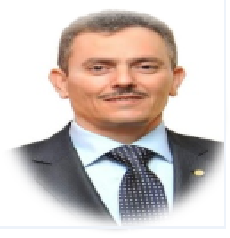 | |
Prof. Omar M. Al-Jarrah | |
Professor of Computer Engineering, Jordan University of Science and Technology, Jordan |
Short Biography:
Omar M. Al-Jarrah Professor of Computer Engineering Vice President of Arab Open University, Kuwait. Omar M. Al-Jarrah received the B.Sc. in Electrical Engineering from at Jordan University of Science and Technology (JUST), Irbid, Jordan in 1991, M.Sc. and Ph.D. in Electrical and Computer Engineering from Ohio State University in 1994 and 1996, respectively. He worked as the founding Dean of the Faculty of Computer and Information Technology from 2000 to 2004. After this, he had appointed as Assistant President for ICT from 2004 to 2010. Then he has appointed as the Vice President of JUST from 2010 to 2013, President of Amman Arab University from 2014 to 2016, and President of Jordan University of Science and Technology/JUST from 2016 to 2017. Prof. Al-Jarrah has managed several national and international research grants. In addition to his academic and administrative services, he has been serving as a consultant and ICT advisor to the ministry of education, ministry of higher education and scientific research, UNESCO Amman office, King Abdullah University Hospital, and a number of private organizations. He has served in various national ICT committees. Prof. Al-Jarrah has been leading the development of Education Management Information Systems at JUST, the ministry of Education, and the Ministry of Scientific Research and Higher Education. Prof. Al-Jarrah has received several national and international awards in recognition of his achievements.
Brief Introduction on the Keynote Speech (talk):
Title:
Cloud computing has changed the landscape of computing during the last decayed; it has widened access to application, services, and infrastructure. Cloud computing has many benefits including reducing the total cost of ownership, increasing business agility, and ensuring scalability and availability. However, there are high security risks and numerous challenges that come with the benefits. In this talk, Prof. Al-Jarrah will focus on the security challenges and shed the light on insider attacks as one of the major security risks in cloud environment. He will present his work on hierarchical detection of insider attacks in cloud computing systems.















































